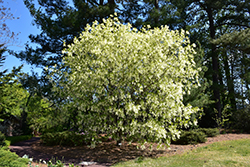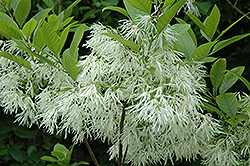Height: 15 feet
Spread: 15 feet
Sunlight:
![]()
![]()
Hardiness Zone: 4a
Other Names: Old Man's Beard, Fringe Tree
Description:
Without a doubt, one of the finest small native trees for spring bloom; plant is absolutely covered in frilly white flowers; generally a good, attractive plant the rest of the year, makes a great accent for smaller home landscapes
Ornamental Features
White Fringetree is clothed in stunning panicles of fragrant white flowers rising above the foliage in late spring. It has emerald green deciduous foliage. The narrow leaves turn yellow in fall.
Landscape Attributes
White Fringetree is a multi-stemmed deciduous tree with a more or less rounded form. Its relatively coarse texture can be used to stand it apart from other landscape plants with finer foliage.
This is a relatively low maintenance tree, and should only be pruned after flowering to avoid removing any of the current season's flowers. It has no significant negative characteristics.
White Fringetree is recommended for the following landscape applications;
- Accent
- Mass Planting
- Hedges/Screening
- General Garden Use
Planting & Growing
White Fringetree will grow to be about 15 feet tall at maturity, with a spread of 15 feet. It has a low canopy with a typical clearance of 2 feet from the ground, and is suitable for planting under power lines. It grows at a slow rate, and under ideal conditions can be expected to live for 60 years or more.
This tree does best in full sun to partial shade. It is an amazingly adaptable plant, tolerating both dry conditions and even some standing water. It is not particular as to soil pH, but grows best in rich soils. It is highly tolerant of urban pollution and will even thrive in inner city environments. This species is native to parts of North America.
Disclaimer - This resource is provided for informational purposes only and does NOT reflect current availability. Inventory varies seasonally, so we cannot guarantee that every plant will be in stock at all times - please contact your favourite GardenWorks location directly for current availability. It does not include our entire inventory of plants, so be sure to visit GardenWorks to see varieties that may not be represented on this list.


